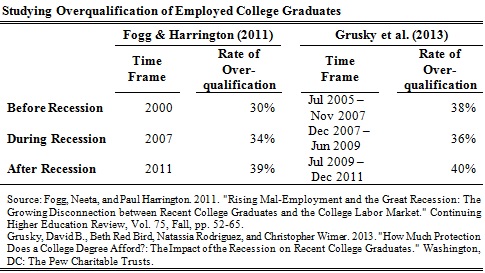May 07, 2013
For young college graduates, high unemployment is certainly a primary concern, but beneath this is the issue of whether those who are employed are being used to their fullest capabilities. Many young graduates who cannot find suitable college-level jobs may opt to accept jobs that do not require college degrees. Two studies examining recent data found that the incidence of this “over-qualification” has risen for graduates of four-year programs in recent years, particularly since the end of the Great Recession. They find that approximately four-in- ten recent college graduates are working at jobs that don’t require a degree, a number similar to the findings of a recent Accenture survey.
Neeta Fogg and Paul Harrington of Drexel University studied the growing disconnect between college graduates and the labor market (2011). Without any standard measurement of defining workers as being “overqualified” for a particular job, Fogg and Harrington utilized the Department of Labor’s O*NET occupational-analysis information system in order to determine which jobs required four-year college degrees (college labor market or CLM)[1]. Concentrating on those between the ages of 20 and 24, Fogg and Harrington defined college graduates (Bachelor’s degree) as being “mal-employed”, or overqualified, if they were not in a CLM occupation. Analyzing cross-sections of three separate years (2000, 2007, 2011) of Current Population Survey data, Fogg and Harrington found that a greater share of young employed graduates turned to jobs for which they were overqualified (see table below for results). Note that these numbers represent the share of those employed, and therefore leave out all of those who are unemployed. As of 2011, over 39 percent of those sampled are employed in jobs that do not use their acquired skills and likely pay less than the average college-level job. We know that long unemployment stints can hurt job prospects and future earnings for workers. It appears that persistent over-qualification can have similar detrimental effects for one’s medium-term earnings (Kahn, 2010; Oreopoulos et al., 2012).

Similar to Fogg and Harrington, Grusky et al (2013) employed O*NET’s classifications to distinguish those occupations that typically require college degrees. Concentrating on 21-24 year olds, Grusky et al estimated job placements across three two-year periods (before recession, 2005-2007; during recession, 2007-2009; and after recession 2009-2011). Despite these subtle differences in sampling, the report’s numbers were very similar to those of Fogg and Harrington. Grusky et al also estimated the numbers for those with high school degrees and Associate’s degrees. Compared with either of these groups, college graduate lost more college-level jobs but the percentage losses were greater for high school and Associate’s graduates. In light of this comparison, Grusky et al suggested that college education had protected many graduates from the worst of the recession. However, having four-in-ten young college graduates overqualified for their jobs is a substantial waste of skill (not to mention the investments made by individuals and their families to acquiring said education).
Job prospects have deteriorated for recent college graduates. Besides facing high unemployment rates, young college graduates are now accepting more jobs that do not require college degrees. Not only do these stints of over-qualification affect the future earnings of these college graduates, they also make it more difficult for high school graduates to find employment as they face competition from higher-educated workers. Young workers certainly face an uphill battle as the economy continues to struggle.
[1] It is important to note that this definition overlooks those who are in a CLM occupation, but the position does not relate to their field of study, typically indicating some mismatch of skills.






